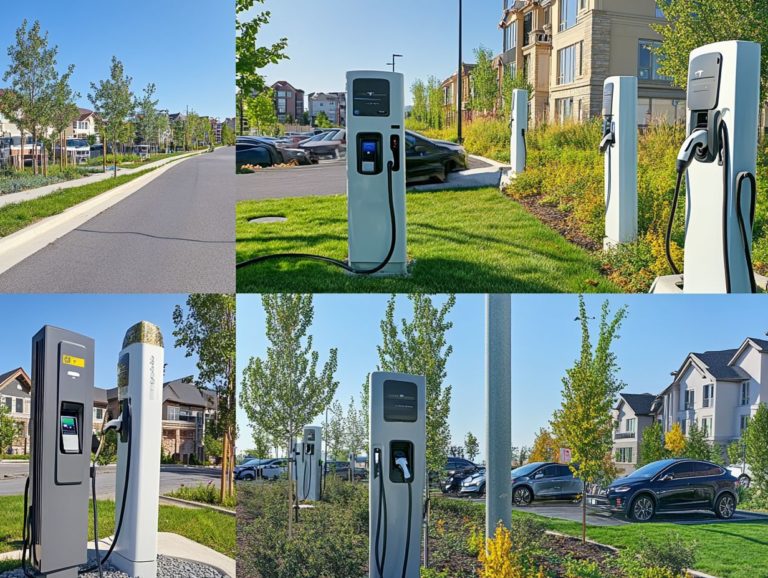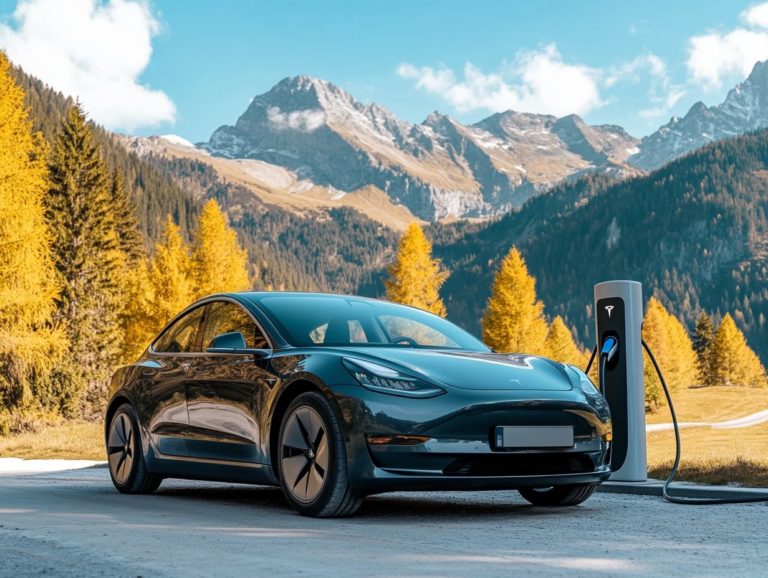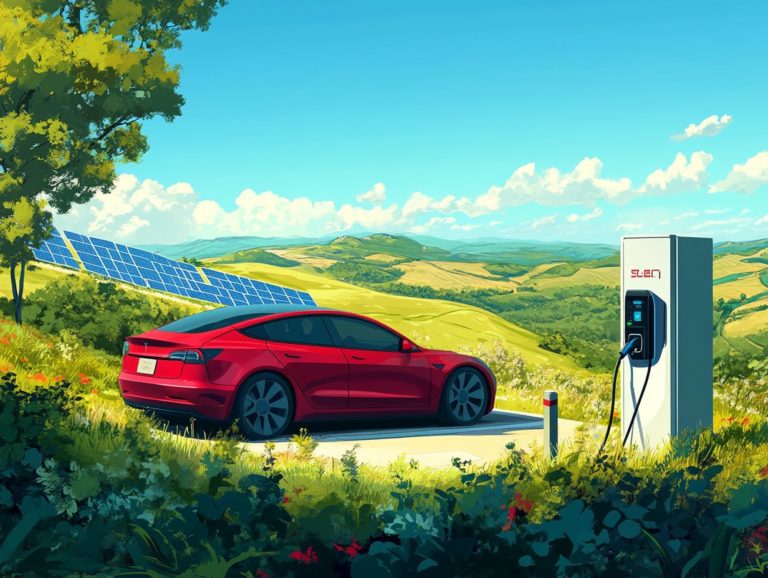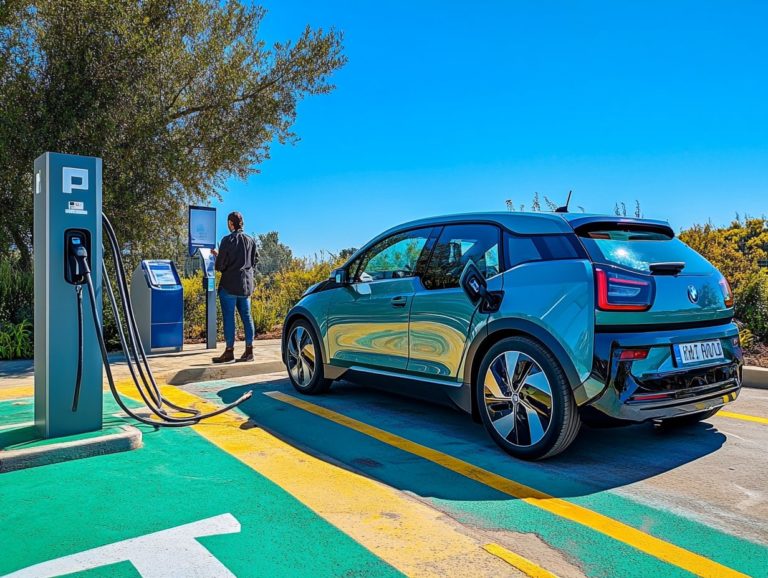What Are the Most Frequently Asked Questions About EVs?
Electric vehicles (EVs) are changing how we drive. They offer a cleaner and smarter option compared to gas-powered cars.
If you are thinking about switching, it’s essential to grasp the many benefits of owning an EV. These benefits include their positive environmental impact and potential savings on fuel and maintenance.
While concerns like range anxiety and charging infrastructure might give you pause, it’s important to look at the overall benefits.
This article tackles frequently asked questions about EVs, highlights the key factors to consider when choosing the right model, and delves into what the future holds for this innovative technology. Dive in to uncover everything you need to know!
Contents
Key Takeaways:

- EVs offer great environmental benefits and money savings, making them an attractive option for eco-conscious and budget-conscious individuals.
- Range anxiety, charging infrastructure, and performance issues are common concerns about EVs. However, advancements in technology are addressing these issues.
- When choosing the right EV, consider factors such as your daily driving needs, budget, and available charging options to find the best fit for your lifestyle.
What Are EVs?
Electric Vehicles (EVs) represent a groundbreaking shift in transportation. They offer a compelling alternative to traditional Internal Combustion Engines, which use fuel. EVs run on electric motors powered by rechargeable Lithium-Ion Batteries that can be charged and reused. This design enhances efficiency and reduces emissions.
When you consider popular models like the Tesla Model S, Chevrolet Bolt, Nissan Leaf, Audi e-tron, and Porsche Taycan, you can see how advancements in EV technology are making them increasingly attractive to those who value eco-friendliness without sacrificing performance.
EVs come in various categories, including Battery Electric Vehicles (BEVs), which rely entirely on electric power, and Plug-in Hybrid Electric Vehicles (PHEVs), which combine an electric motor with a conventional engine. This duality helps reduce dependence on fossil fuels and significantly cuts greenhouse gas emissions. Plus, many drivers enjoy a quieter, smoother ride compared to gas-powered cars.
The financial benefits are hard to ignore. Lower maintenance and fuel costs make these vehicles a wise choice. With more manufacturers entering the market and developing models that cater to diverse driving preferences from the compact Nissan Leaf to the high-performance Porsche Taycan it s clear that the future of transportation is increasingly steering towards electric power.
Benefits of Owning an EV
Owning an Electric Vehicle (EV) offers you many benefits, from impressive environmental advantages to significant cost savings. With the latest technological advancements, these vehicles not only help reduce greenhouse gas emissions but also provide lower operational costs compared to traditional cars.
Federal tax incentives make switching to an electric car more appealing. This transforms EVs into an increasingly attractive option for those who want to make a positive impact on the environment while also keeping money in their pocket.
Don’t miss out on the chance to drive a cleaner car and save money!
Environmental Impact
The environmental impact of electric vehicles (EVs) stands out as one of their most compelling advantages, mainly due to their significantly lower emissions from production to use when compared to traditional internal combustion engine vehicles. By harnessing renewable energy sources for electricity, you can enjoy the benefits of zero-emission vehicles, contributing to cleaner air and reduced greenhouse gas emissions crucial elements in the fight against climate change and for promoting sustainable living.
In contrast, conventional vehicles heavily rely on fossil fuels. These vehicles emit harmful pollutants and carbon dioxide, worsening global warming and deteriorating air quality. This stark contrast underlines the pressing need to transition to electric mobility, especially as many countries set ambitious goals to ramp up renewable energy usage.
When EVs are powered by solar, wind, or hydroelectric sources, the associated emissions can be virtually nonexistent, highlighting their pivotal role in environmental preservation. By fully embracing this technology, you can help pave the way toward a more sustainable future, cultivating cleaner urban environments for generations to come.
Cost Savings
Cost savings are a compelling reason for you to consider electric vehicles (EVs) over traditional options. While the initial purchase price might be higher, the lower operational expenses and the various federal tax credits available can significantly enhance your financial outlook. Think about it: reduced fuel costs, lower maintenance expenses, and potential savings on charging all of these factors contribute to making EVs an economically viable choice in the long run.
You may also find yourself pleasantly surprised by the incentives offered at both state and local levels, which only sweetens the deal. Don t forget to consider how EVs often hold their value better than gasoline vehicles! Plus, the charging options are continuously expanding, providing you with convenient and often cheaper places to charge your car at home or public stations. This expansion further boosts your potential savings.
With the rise of renewable energy sources, charging an EV not only becomes more cost-effective but also aligns with sustainable practices, marrying financial benefits with environmental responsibility. Curious how much you could save? Let s break it down!
Common Concerns About EVs
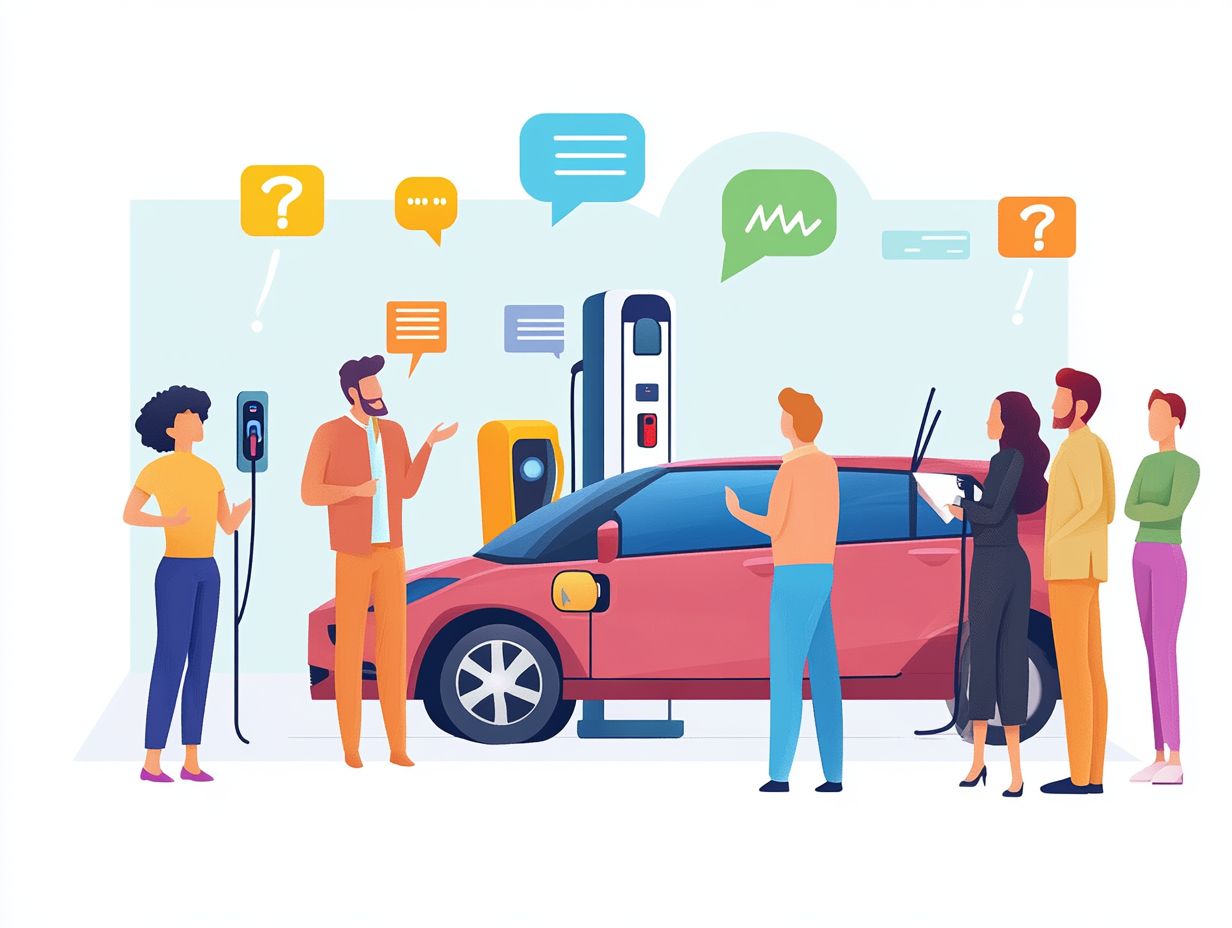
Despite the myriad benefits of electric vehicles (EVs), it’s not uncommon for potential buyers to harbor certain concerns that may impede their decision-making process. Primarily, questions surrounding EV range and charging infrastructure often come to the forefront.
Range anxiety the apprehension of running out of battery along with uncertainties about the availability of charging stations, can understandably create hesitation. Performance inquiries and maintenance tips related to EVs are crucial considerations for new owners eager to make an informed choice.
Range Anxiety
Range anxiety is a common concern for you as a potential electric vehicle (EV) buyer, often rooted in uncertainties about EV range and the availability of charging stations. The fear of running out of battery power before reaching your destination can hold you back from embracing electric cars, even with the ongoing advancements in battery technology and infrastructure.
You might find yourself worrying about the limitations of electric vehicles, especially on longer journeys where charging options could be limited. This concern is intensified by questions about the real-world performance of EVs, including how factors like weather conditions and driving habits can affect battery life.
Fortunately, recent technological innovations such as enhanced battery efficiency and the growth of fast-charging networks are beginning to tackle these issues head-on. As the number of charging stations increases and the reliability of electric vehicle ranges improves, you may start to feel more confident in your choice to transition to a more sustainable mode of transportation.
Charging Infrastructure
The development of a reliable charging infrastructure is vital for you to fully embrace the world of Electric Vehicles (EVs). It directly impacts the convenience and feasibility of your charging experience. Having access to charging stations, including options for DC Fast Charging (a fast way to recharge your car’s battery), is essential for enabling you to recharge your vehicle effectively. This eases any concerns you may have about range anxiety.
As the EV market evolves from niche to mainstream, the presence of various charging solutions becomes increasingly significant for you. Options like Level 2 chargers in residential neighborhoods and public spaces are essential. Additionally, advancements in EV charging technologies, including wireless charging and ultra-fast systems that can replenish your battery in mere minutes, promise to dramatically enhance your user experience.
These innovations are designed not only to accelerate charging times but also to improve the accessibility of charging points. This ensures that you can find reliable options no matter where your travels take you. As cities strive for greener alternatives, the collaboration between cutting-edge technology and strategic urban planning will be instrumental in shaping the future landscape of EV charging for you and other EV owners.
Performance and Maintenance
Performance and maintenance are crucial considerations for you as a potential Electric Vehicle (EV) owner. These factors especially matter for the longevity and efficiency of the Lithium-Ion Batteries powering these vehicles. By understanding common EV maintenance tips, you can enhance your vehicle’s performance while addressing key questions about acceleration, handling, and the overall driving experience.
In the ever-evolving landscape of automotive technology, it s essential to examine how these modern machines compare to their traditional counterparts. One major advantage you ll likely notice is the remarkable power delivered by electric motors, enabling impressive acceleration without the lag that often plagues internal combustion engines. EVs have a lower center of gravity, which improves stability during sharp turns.
Battery efficiency is critical as it impacts not only your range but also your vehicle’s overall performance. This highlights the significance of regular software updates and battery health checks as essential components of a thorough maintenance routine.
How to Choose the Right EV for You
Selecting the perfect Electric Vehicle (EV) demands thoughtful consideration of several key factors. These include EV range, overall cost, and the choice between a fully electric model or a Hybrid Electric Vehicle.
You should take the time to evaluate your unique driving habits, budgetary limits, and lifestyle preferences to identify the EV that aligns seamlessly with your needs. This ensures a rewarding ownership experience and can significantly enhance your daily life!
Factors to Consider
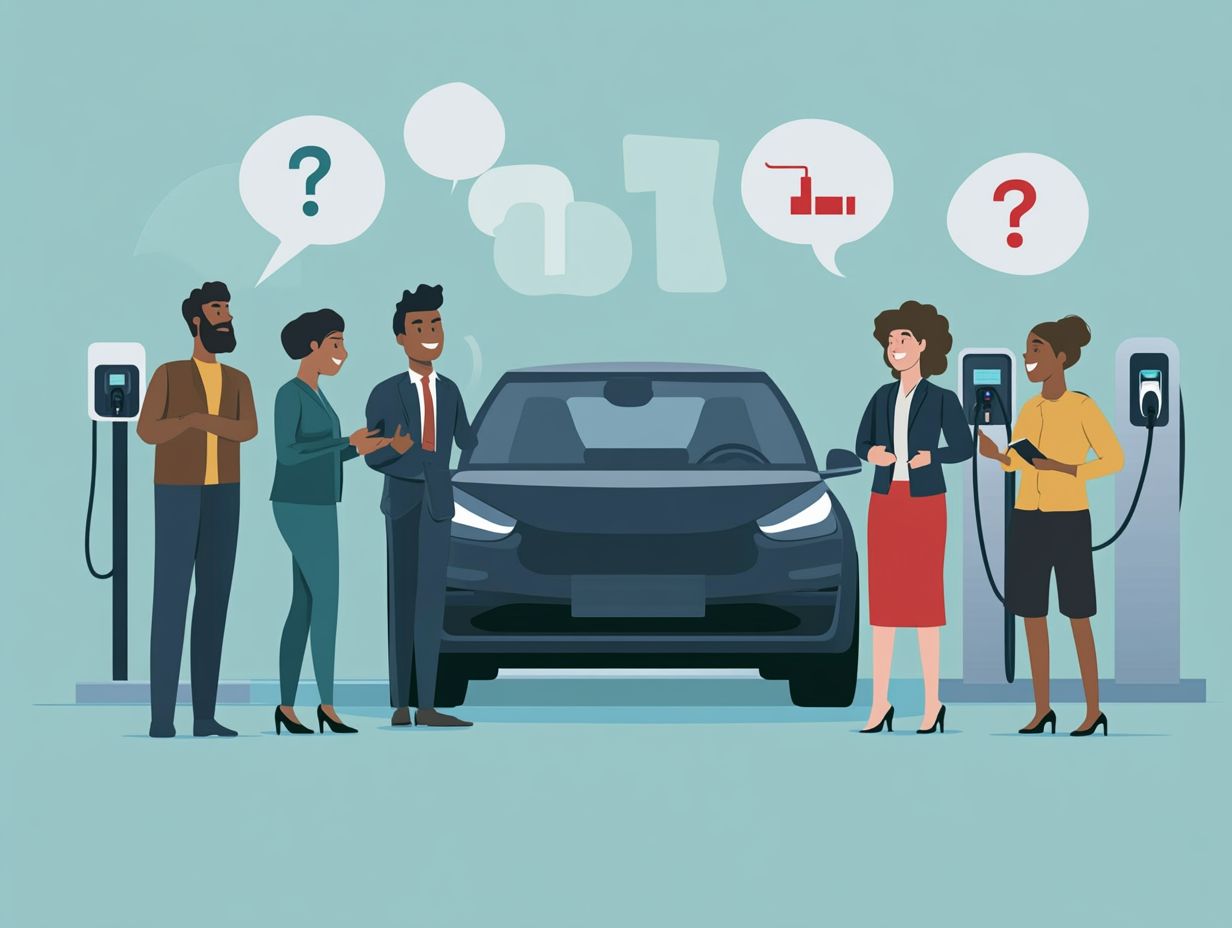
When you re selecting an Electric Vehicle (EV), it s crucial to consider factors like EV Range, overall cost, and the expected charging expenses that come with ownership. You ll want to address any performance questions you have to ensure the vehicle aligns perfectly with your driving needs and preferences.
To make a well-informed choice, evaluating how far the vehicle can travel on a single charge is key. This significantly affects your daily usability and long-distance journeys. You should also take a close look at the total cost of ownership, which encompasses not just the upfront price but also any potential incentives and rebates in your area that could substantially reduce your expenses.
Understanding the charging infrastructure available in your locality is vital for assessing both convenience and any additional costs associated with home charging setups. Finally, don t overlook performance attributes such as acceleration, handling, and range under various driving conditions. These elements are essential for ensuring long-term satisfaction with your vehicle.
Don t miss out on the future of driving! Start your electric journey today! Research your options and find the perfect EV for you!
Future of EVs
The future of electric vehicles (EVs) looks exciting! Innovations in battery technology and renewable energy are leading the charge for you.
Market projections show that adoption of EVs is set to skyrocket as manufacturers continue to innovate and enhance vehicle capabilities. This makes them not only more attractive as a consumer but also effectively addresses pressing environmental concerns.
Technological Advancements
Technological advancements in electric vehicles (EVs) are reshaping the automotive landscape. Innovations like improved lithium-ion batteries and quick charging are leading the way.
These developments boost performance and align seamlessly with renewable energy initiatives. They pave the path toward a more sustainable future in transportation.
As you explore this evolving industry, watch for advancements in solid-state batteries. These breakthroughs can improve how much energy a battery can store and safety features, addressing previous limitations.
The rollout of ultra-fast charging stations, equipped with advanced grid technologies, showcases how EVs are becoming increasingly practical for everyday use.
Companies are embracing smart charging infrastructures that optimize energy consumption. This allows you to tap into renewable sources during off-peak hours.
This harmonious relationship between technological innovations and sustainability highlights a clear commitment to reducing carbon footprints while enriching your overall driving experience.
Market Projections
Market projections for electric vehicles (EVs) indicate a significant surge in adoption rates in the coming years, fueled by consumer demand, advancing technology, and enticing Federal Tax Incentives that promote these eco-friendly choices.
You can expect the EV market to keep expanding as more individuals recognize the long-term benefits of making the switch.
As awareness of environmental issues increases, you’re likely among those seeking sustainable alternatives to traditional gasoline-powered vehicles. With a growing array of EV models tailored to meet diverse consumer needs, states are stepping up to offer additional support, such as rebates and the development of charging infrastructure.
The combination of these supportive measures, alongside advancements in battery technology that reduce costs and improve performance, suggests that the EV market is on the brink of robust growth.
Ultimately, your acceptance of electric mobility, combined with favorable policies, will help shape a promising future for sustainable transportation in the years ahead.
Frequently Asked Questions
What Are the Most Frequently Asked Questions About EVs?
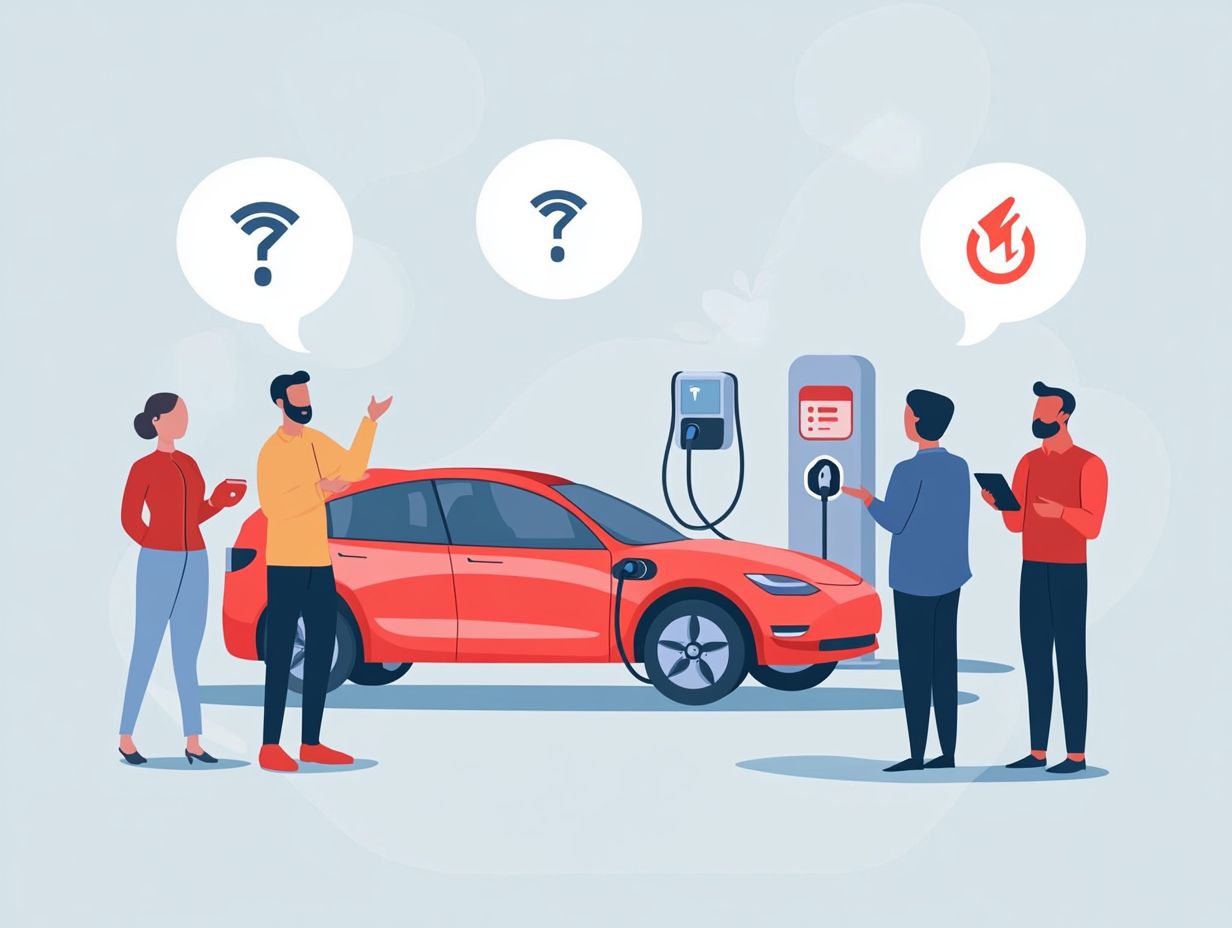
The most frequently asked questions about EVs include:
- How do electric cars work?
- How long does it take to charge an EV?
- What is the driving range of an EV?
- Are there enough charging stations available for EVs?
- How much does it cost to own an EV?
- Can an EV be used for long-distance travel?
How do electric cars work?
Electric cars use an electric motor powered by a battery to drive the wheels. The battery is charged by plugging it into an external power source.
How long does it take to charge an EV?
The time it takes to charge an EV depends on the type of charging station and the size of the EV’s battery. Here’s a quick overview:
- Level 1 charger: 8-12 hours
- Level 3 fast charger: 30 minutes to 1 hour
What is the driving range of an EV?
The driving range of an EV varies depending on the model and battery size. On average, EVs can travel between 100-250 miles on a single charge.
Are there enough charging stations available for EVs?
The number of charging stations is increasing as the demand for EVs grows. However, the availability of charging stations varies by location.
How much does it cost to own an EV?
The cost of owning an EV may vary depending on the model, but they can be more expensive upfront compared to gas-powered cars. However, they have lower maintenance and fuel costs, making them more affordable in the long run.
Can an EV be used for long distance travel?
Yes, EVs can be your trusty companion for long trips! Just remember to plan ahead.
Make sure there are enough charging stations along your route to recharge the battery. Some EVs have longer driving ranges, making long-distance travel easier.

